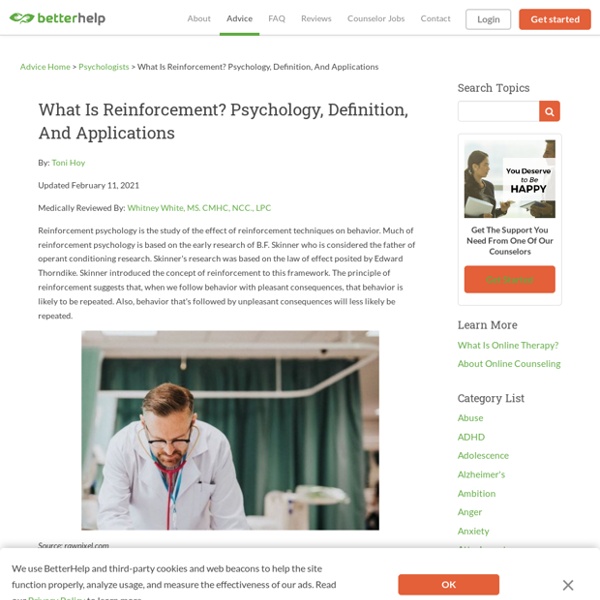Zoom
Trash



What Is Reinforcement in Operant Conditioning? One of the many different ways in which people can learn is through a process known as operant conditioning (also known as instrumental conditioning).1 This involves learning through reinforcement or punishment. The type of reinforcement used can play an important role in how quickly a behavior is learned and the overall strength of the resulting response. Understanding Reinforcement Reinforcement is a term used in operant conditioning to refer to anything that increases the likelihood that a response will occur. Psychologist B.F. Skinner is considered the father of this theory.
Definition of Reinforcement by Merriam-Webster re·in·force·ment | \ ˌrē-ən-ˈfȯrs-mənt 1 : the action of strengthening or encouraging something : the state of being reinforced 2 : something that strengthens or encourages something: such as The Difference between Positive/Negative Reinforcement and Positive/Negative Punishment February 5, 2013 7:40 pm Published by Kelley Prince M.A., BCBA In Applied Behavior Analysis, there are two types of reinforcement and punishment: positive and negative. It can be difficult to distinguish between the four of these. Therefore, the purpose of this blog is to explain the differences in order to help parents and professionals develop appropriate interventions to improve behavior. Using Positive Reinforcement to Improve Behavior When your child misbehaves, rewards might be the last thing on your mind. But, positive reinforcement can be one of the most effective behavior modification techniques.1 You can use positive reinforcement to encourage prosocial behaviors, like sharing or following directions. And, you can use it to prevent misbehavior, like hitting and rule violations. Positive reinforcement can also be an effective way to encourage and motivate your child to be responsible, do their chores, get along with their siblings, or complete their homework assignments without arguing.
What Is Punishment Psychology, And Should You Use It? Updated February 01, 2021 Medically Reviewed By: Tanya Harell Source: rawpixel.com We were all punished when we were younger at one time or another. Positive Reinforcement in Psychology (Definition + 5 Examples) If you read our earlier piece on positive punishment, you know that there are different methods of teaching and instilling good habits and behaviors. One of the most powerful and effective methods is one that you’re probably at least somewhat familiar with: positive reinforcement. Before you read on, we thought you might like to download our 3 Positive Psychology Exercises for free. These science-based exercises will explore fundamental aspects of positive psychology including strengths, values and self-compassion and will give you the tools to enhance the wellbeing of your clients, students or employees. You can download the free PDF here. What is the Meaning of Positive Reinforcement?
12 Examples of Positive Punishment & Negative Reinforcement You might be thinking that “positive punishment” sounds like an oxymoron, after all, how can punishment be positive? Not many people “like” punishment, right? The disconnect in understanding this concept comes from the usage of the word “positive;” here at PositivePsychology.com, we generally use the term “positive” to refer to things that are inherently good, things that are life-giving, and things that promote thriving and flourishing. The concept of positive punishment comes from a very different era and a very different perspective on psychology; namely, the 1930s and behaviorism.
10 Normal Teenage Behavior Problems And How To Handle Them Understanding Teenage Behavior Problems Dealing with a teenager is not easy. No matter how good a parent you are, and how great your relationship with your children is, you are likely to face parenting roadblocks when it comes to your teenager. Behavior problems are common in teenagers. But you can deal with them with ease if you are willing to put in the effort to understand what they are going through and what it is that they need from you. MomJunction gives you insight into teenage behavioral problems and how you can deal with them without straining the relationship with your child. A Parent's Guide to Surviving the Teen Years You've lived through 2 a.m. feedings, toddler temper tantrums, and the back-to-school blues. So why is the word "teenager" causing you so much worry? When you consider that the teen years are a period of intense growth, not only physically but emotionally and intellectually, it's understandable that it's a time of confusion and upheaval for many families.
How Teens Today Are Different from Past Generations Every generation of teens is shaped by the social, political, and economic events of the day. Today’s teenagers are no different—and they’re the first generation whose lives are saturated by mobile technology and social media. In her new book, psychologist Jean Twenge uses large-scale surveys to draw a detailed portrait of ten qualities that make today’s teens unique and the cultural forces shaping them. The Study of Punishment in Psychology Punishment is a term used in operant conditioning to refer to any change that occurs after a behavior that reduces the likelihood that that behavior will occur again in the future. While positive and negative reinforcements are used to increase behaviors, punishment is focused on reducing or eliminating unwanted behaviors. Punishment is often mistakenly confused with negative reinforcement. The difference: Reinforcement increases the chances that a behavior will occur and punishment decreases the chances that a behavior will occur. Types of Punishment
Adolescence (15-17 years old) CDC’s Adolescent and School Mental Health Learn how connection is key to good adolescent mental health. CDC’s Parent Information (Teens 12— 19) This site has information to help you learn how to guide your teen to be safe and become a healthy and productive adult. CDC’s Healthy Weight Information. Tips for parents – Ideas to help children maintain a healthy weight. CDC’s Youth Physical Activity Guidelines This site has information on how to help children be active and play. CDC’s Pregnancy Prevention for Teens.